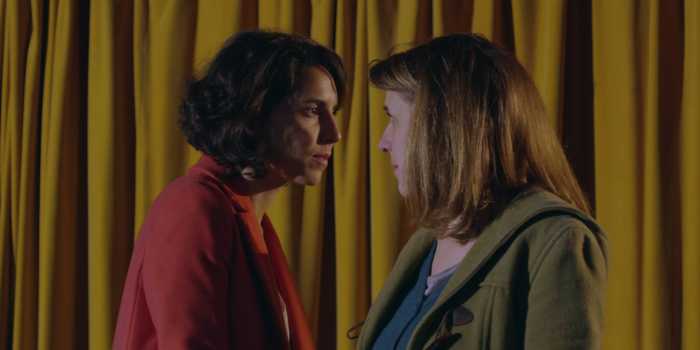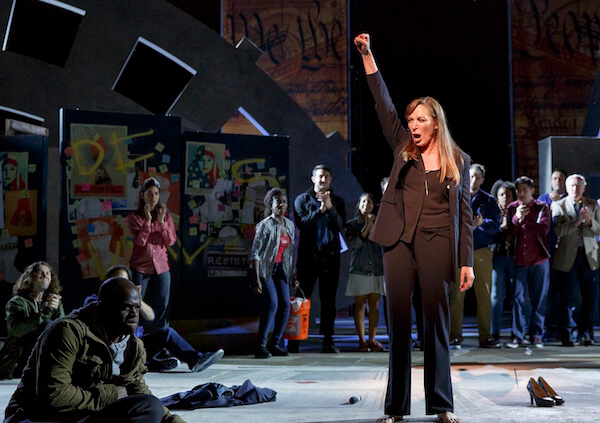At this point, there is very little that hasn’t been done to Shakespeare to make it “fresh” or “relevant” — from changing the setting and period to, more recently, balancing diversity in the casting and characters. When they work, they can be delightful and thought-provoking. When they fail, watching can become an exercise in surviving tedium. Most, though, fall in the middle with some good ideas and interesting elements but often limping along in a kind of self-consciousness that neither fully serves the play nor the concept. These tend to become an intellectual — rather than emotional — experience. One can, to a degree, appreciate the production without being engaged or moved.
That unfortunate middle ground is where NAATCO’s new production of “Romeo and Juliet” falls. Featuring a talented, Asian-American company and a script billed as a “modern verse translation” by Hansol Jung, co-directors Jung and Dustin Wills have opted for slapstick comedy, gimmicks (such as having a coatrack with a sign representing Lady Capulet), and a beatboxed score. At the outset, this works to emphasize the teenage energy of Romeo and his fellow Verona teens as they love, fight, and generally wreak havoc for the older generation. The opening scene is rollicking and manic, infused with testosterone-fired energy. The problem comes when “R&J” shifts from comedy to romance and ultimately to tragedy. Trying to maintain the antic tone as the story shifts is confusing and feels labored, ultimately robbing the audience of the full experience of the tragedy.
The play is staged on raised disc in the center of the space with the audience seated on two sides. Actors come and go from the sides, and there are trap doors in the stage. For the balcony scene, Juliet rises out of the stage, rather than being addressed from below. The stage and the surrounding area are littered with random props that make Verona look like a down-at-heels thrift shop. Most of them are used, but it’s not clear why, and by the time Juliet is lying in the tomb, she is surrounded by all this stuff, which doesn’t do much other than impede movement on the stage and challenge sightlines.
This largely confusing clutter extends to the revamping of the text. The cuts and changes, with few exceptions, don’t go much beyond what most directors do in trying to clarify the text without claiming that it’s new. A few of the word changes are glaring in that they stall the meter of the original and make it hard to play without gaining any contemporary clarity. Juliet’s speech, “Gallop apace, you fiery footed steeds towards Phoebus’ lodging,” — at a point where she has married Romeo but has not yet consummated the union — has speed, reflecting her anxiety. When “Phoebus’” is replaced with “Apollo’s,” that urgency is cut short. Then there’s the introduction of more homoerotic play between the young men at the beginning. It’s overkill, or to cite “As You Like It,” “laid on with a trowel.” Most confusing of all is what feels like a lengthy discourse on Prince’s “Purple Rain” toward the end of the play. Just at the time when the play is heading for its climax, this incongruity breaks the tension in the drama and simply seems gratuitous. It doesn’t make the play more accessible — quite the opposite. Jung proves, once again, that no matter how many people have tried, it’s not easy to improve on Shakespeare, and the attempt can be a fool’s errand.
The cast, however, is game, and delivers the piece with good-humored energy. Major Curda as Romeo is appropriately angsty through the early part of the play. He strums a guitar and sings some of the lines, and delivers the romantic depth of the role as the tragedy grows. Brian Lee Huynh as Capulet and Mia Katigbak as the Nurse give two of the clearest — and most affecting performances. Significantly, theirs are the lines least altered, and Katigbak, particularly, finds the love beneath the bawdiness that animates the Nurse. Daniel Lui who plays the servant Peter and Lady Capulet (when not portrayed by the aforementioned coatrack), succeeds on his abundant charm and comic timing, despite the direction that has him running about throughout the entire piece for no apparent reason. Dorcas Leung as Juliet seems to be walking through the role. She never convincingly conveys Juliet’s passion, and her muddy diction, particularly when facing away from half the audience, makes one of the theater’s most poetic roles pedestrian.
NAATCO is an exceptional company that often does fine work, but this isn’t among their best. By all means, making Shakespeare relevant and accessible can be a valid exercise, but when the concept obscures rather than enlightens, it’s a dish served cold.
































